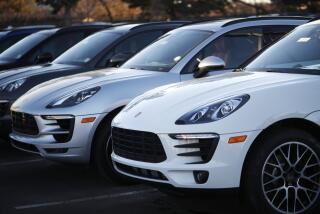Volvo, Renault to Merge, Become No. 6 Car Maker
- Share via
PARIS — With Europe’s recession-struck car makers nervously eyeing Japan’s muscle, two of the Continent’s most profitable auto manufacturers--France’s Renault and Sweden’s Volvo--said Monday they will merge, creating the world’s sixth-largest car maker.
The merger, to take effect Jan. 1, will bring together two car makers whose names are national treasures in their homelands. Indeed, the French government owns 80% of Renault.
The deal also reflects the willingness of European industry to ignore national boundaries in the interests of economic survival, both against threats from European and Japanese competitors.
The merger would make the combined Renault-Volvo company a stronger competitor to Germany’s Volkswagen AG and the United States’ General Motors Corp.--the European Community’s largest auto makers.
The new company--to be known as Renault-Volvo RVA--would have an annual revenue of about $38 billion and sell 2.4 million cars a year. Only GM, Ford, Toyota, Volkswagen and Nissan would be larger.
The merger will have little impact on the North American automotive market. Last year, Volvo sold about 73,500 of its boxy sedans and station wagons in the United States and Canada--less than one-quarter of its worldwide sales of 303,800. It holds less than 1% of the U.S. auto market. Renault pulled out of the U.S. market in 1987.
But the combined company will own a sizable stake in the U.S. market for heavy trucks, the 16-wheelers and other large commercial vehicles, and so the merger must be approved by the Antitrust Division of the U.S. Department of Justice, according to Tomas Ericson, vice president for corporate communications at Volvo North America’s New York office.
The auto makers’ merger will combine Volvo-GM Heavy Truck Corp., Volvo’s joint venture with General Motors, and Renault’s Mack Trucks division, making Renault-Volvo the world’s second-largest truck manufacturer, behind Germany’s Mercedes-Benz. In 1992, Volvo-GM and Mack combined held more than 22% of the U.S. market in heavy trucks and about 20% of Europe’s heavy truck market.
“We aim to be one of the most profitable companies in our industry,” said Volvo Chairman Pehr Gyllenhammar. “Together we will have clout and power.”
Renault Chairman Louis Schweitzer added, “We need to go as fast as we can to beat the Japanese in Europe with our strength.”
The deal came only two days after European auto makers, struggling with weak local demand for vehicles, won a reprieve from Japan, which holds 12% of the European car market. An official with Japan’s Ministry of International Trade and Industry said the country had agreed to limits on vehicle exports to European Community countries this year.
The result will be an 18.5% drop in Japanese exports to EC countries this year.
Overall, European car sales were down 17.5% during the first eight months of 1993 and aren’t expected to improve next year, analysts said.
Initially, Renault-Volvo RVA will be 65% owned, directly and indirectly, by the French government.
Volvo will own 35% of the new company and will retain veto power over major strategic decisions, the companies said at a joint news conference in Billancourt, France, on Monday.
Schweitzer, Renault’s chairman, will head the new company. Volvo’s chairman, Gyllenhammar, is expected to be named chairman of a new supervisory board. The new corporate headquarters will be at Renault’s headquarters in southwest Paris.
Renault and Volvo said their product lines and names will remain separate but that they expect the joint operations to save the new company more than $5 billion over the next seven years.
The deal, which is valid for 25 years, certainly will save Renault money, but it may have rescued Volvo’s car business, analysts said. Volvo, which lost $435 million last year, has eliminated more than 3,000 jobs this year. Like Renault, Volvo has been profitable so far this year.
In fact, Renault, which was bailed out by the French government in 1986 following years of losses, has become one of the healthiest auto makers in Europe. Last year, it earned $1 billion on sales of $26.7 billion.
Renault makes a broad range of automobiles with mass market appeal and is especially strong in southern Europe. Volvo’s sedans and station wagons, known for their angular style and safety, appeal to a more affluent market, chiefly in northern Europe.
In the United States, Volvo’s sales hit a peak at about 100,000 cars in the mid-1980s, when its cars appealed to young, upscale families--a buying segment now attracted to sport-utility vehicles, such as Jeep. Renault ended its bid for a portion of the U.S. car market in 1987, when it sold its controlling interest in American Motors Corp. to Chrysler Corp.
Kraft reported from Paris and Walters from Los Angeles.
More to Read
Inside the business of entertainment
The Wide Shot brings you news, analysis and insights on everything from streaming wars to production — and what it all means for the future.
You may occasionally receive promotional content from the Los Angeles Times.











